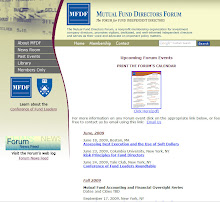Harvard Law School professor, John C. Coates IV, has recently published a paper examining the taxation of U.S. mutual funds and, in particular, how this tax treatment may create disadvantages for U.S. mutual funds in the global market. Coates previewed a draft of the paper, entitled "Reforming the Taxation and Regulation of Mutual Funds: A Comparative Legal and Economic Analysis," at the October 27, 2008 roundtable of the Conference of Fund Leaders, which was sponsored by the Mutual Fund Directors Forum and the Millstein Center for Corporate Governance and Performance at Yale's School of Management. The Forum invited Coates to discuss the paper with the fund independent chairs and lead independent directors at the October CFL roundtable because of his analysis of and conclusions about the effect of tax treatment of U.S. mutual funds on the international competitiveness of U.S. mutual funds.
Coates' analysis finds that the tax treatment of U.S. mutual funds has a strongly negative effect on the global competitiveness of domestic mutual funds:
- Mutual funds are taxed less favorably and regulated more extensively in the US than direct investments or other collective investments, including alternatives available only to wealthy investors;
- The US fund industry continues to be the world leader, but now lags domestic and foreign competitors, primarily because of US tax and securities law.
Coates’s paper also proposes certain internal structural and regulatory changes to the SEC, but his proposals for changes to the tax treatment of U.S. mutual funds clearly would require Congressional action. His paper makes clear that these proposals would have a significant effect on the competitive position of U.S. mutual funds in the global market.
Among the proposals Coates analyzes are:
- eliminating taxes on capital gains;
- eliminating corporate-level taxation;
- eliminating the requirement that mutual funds distribute capital gains or long-term capital gains; and
- adding mutual funds to the list of publicly held funds that are permitted to use true pass-through tax treatment.
Professor Coates' paper brings some long awaited academic data and analysis to support what many, if not most, in the U.S. fund industry have suspected for quite some time about the disadvantages the U.S. Tax Code places on domestic mutual funds. As U.S. funds face increasing global pressures, Coates' data and conclusions may help clarify for policymakers and regulators the competitive issues that funds face.
The full text of the December 1, 2008 draft of Coates' paper is available at: http://www.ignites.com/pdf/2008/12/ssrn-id13119451.pdf





